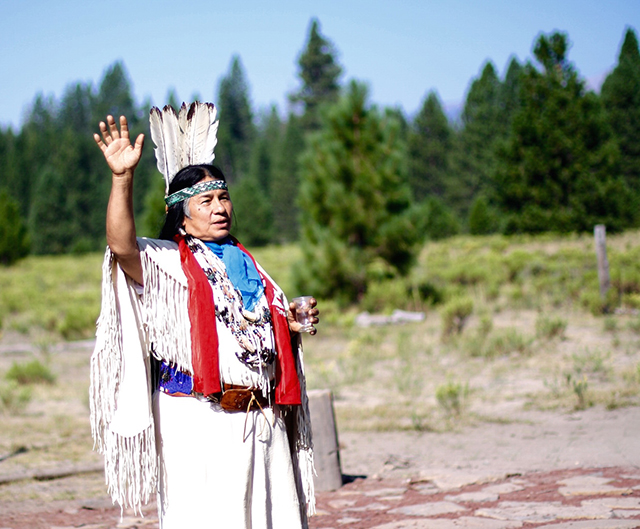
At a sacred fire in the ancient village site in Coonrod, Chief Caleen Sisk raised a glass of ceremonial water towards a soaring Mount Shasta. The Winnemem Wintu Tribe members gathered for a Fire and Water ceremony at sunrise to pray for the return of their revered salmon and for the health of their sacred spring in Mount Shasta and surrounding waterways. “Salmon are life. They bring life, and they should be back on this land again,” said Chief Sisk, spiritual leader of her tribe.
The Winnemem Wintu are known as the Middle Water People, their identity tied spiritually to a sacred spring on Mount Shasta, a river that once flowed here unfettered and the Chinook salmon that flourished in the waters. When Shasta Dam was built in 1945, the Winnemem lost 90 percent of their sacred and ceremonial sites, along with ancient villages that dotted the banks of McCloud River. The Chinook salmon, which was prized for its rich winter run in the McCloud River, faced a cataclysmic wall of the dam and lost their spawning grounds, where they had propagated for millennia.
“When Shasta Dam was build both the salmon and the Winnemem lost their homes,” said Chief Sisk. In July this year, California Senator Dianne Feinstein introduced a $1.3 billion emergency drought relief bill to “support communities affected by drought.” One of the provisions of the bill included authorization of $600 million for Calfed storage projects, which may increase the height of Shasta Dam by 18-½ feet. “Many of our remaining sacred sites will be under water. This is an ongoing cultural genocide,” said Chief Sisk.
Despite the horrors of colonization, the Gold Rush, diseases and displacement from Shasta Dam, the Winnemem have tenaciously held on to their cultural and spiritual traditions and remaining ceremonial sites. The Winnemem believe this proposed dam height increase would profit and benefit the largest and most powerful agribusiness interests in the state. “This water is not going to benefit the millions of people in California. It’s going to benefit a small, privileged group of corporate farmers,” said Chief Sisk.
Some water policy experts are not convinced that increasing the height of Shasta Dam is going to yield any more water. “These rivers are already dammed and developed. New dams don’t result in much yield. It’s mind boggling if you are Winnemem Wintu. You have essentially the most powerful state politicians against you,” said Ron Stork, Senior Policy Advocate at Friends of the River, a statewide river conservation group.
Winnemem have been on a long, arduous road to justice. “The Winnemem never received reparations when they lost their traditional lands when the dam was first built,” said Trent Orr, staff attorney at Earthjustice. “Plus there are serious questions about how water is allocated in the state. What we need is sensible irrigation of agricultural land, promoting re-use and purification of waste water.”
At the Fire and Water Ceremony, the Winnemem were joined by indigenous allies, who traveled far and wide to express solidarity and support. “Our land was stolen without compensation or reparations. We lost most of our sacred sites that lie under water in Shasta Lake,” said Chief Sisk. The Winnemem are determined that history will not repeat itself. “We are going to take a stand as best we can,” she said. “We have to wake up the public. We have to let them know what is happening. And we have to make a home for the salmon to return back here to the river. We believe that if good things happen for the salmon, then good things will also happen for us.”
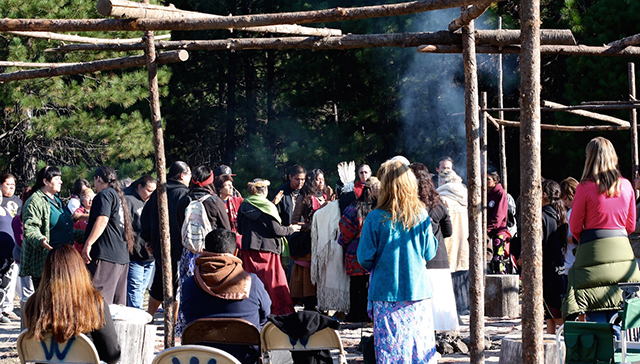 The Winnemem have tenaciously held on to their traditional spiritual and cultural practices in the face of colonization, the horrors of the Gold Rush and displacement from Shasta Dam in 1945. (Photo: Rucha Chitnis)
The Winnemem have tenaciously held on to their traditional spiritual and cultural practices in the face of colonization, the horrors of the Gold Rush and displacement from Shasta Dam in 1945. (Photo: Rucha Chitnis)
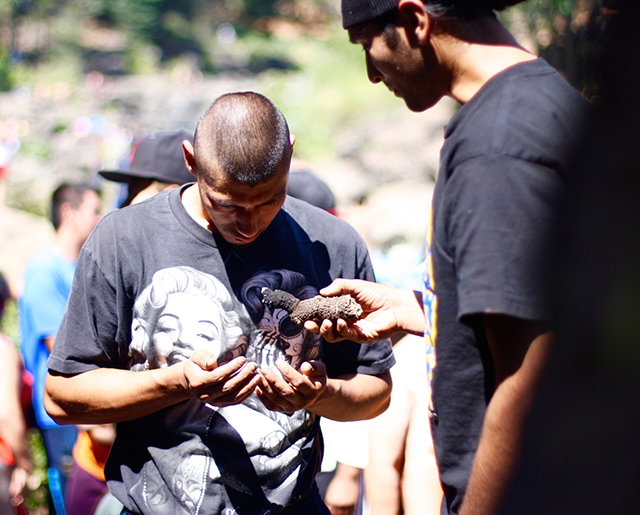 The Chinook salmon, nur, is deeply revered in Winnemem spiritual beliefs. According to the Winnemem creation story, the salmon gave humans its voice in exchange for a promise that they would speak on its behalf. The Winnemem gather for a “salmon challenge” to remember their relative, who lost its home in the McCloud River after Shasta Dam was built. (Photo: Rucha Chitnis)
The Chinook salmon, nur, is deeply revered in Winnemem spiritual beliefs. According to the Winnemem creation story, the salmon gave humans its voice in exchange for a promise that they would speak on its behalf. The Winnemem gather for a “salmon challenge” to remember their relative, who lost its home in the McCloud River after Shasta Dam was built. (Photo: Rucha Chitnis)
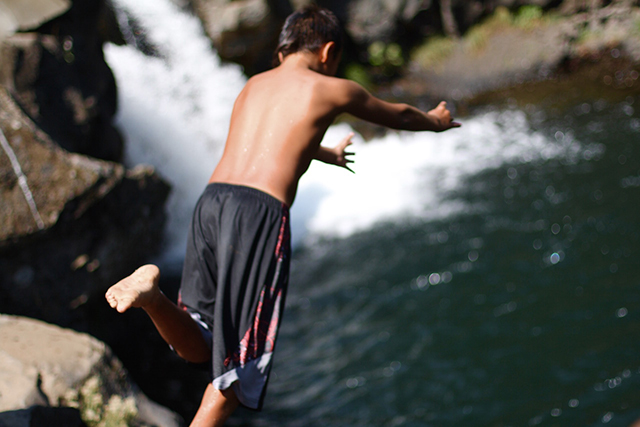 At the salmon challenge, the Winnemem trace the path of the Chinook as it would swim up the three waterfalls on the McCloud River to spawn and regenerate. “When the salmon come back to the river, that’s when things will be good for us again. Until then we will continue to work on that pathway for the salmon to come back,” said Chief Sisk. (Photo: Rucha Chitnis)
At the salmon challenge, the Winnemem trace the path of the Chinook as it would swim up the three waterfalls on the McCloud River to spawn and regenerate. “When the salmon come back to the river, that’s when things will be good for us again. Until then we will continue to work on that pathway for the salmon to come back,” said Chief Sisk. (Photo: Rucha Chitnis)
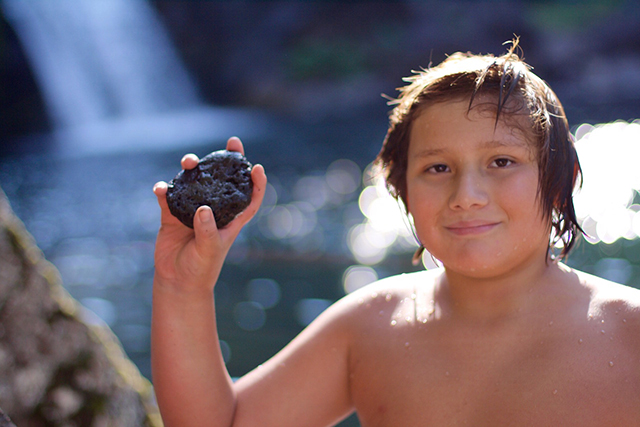 “Whatever happens to the salmon, happens to us,” believe the Winnemem. When Shasta Dam was built, both the Winnemem and the salmon lost their homes on the river. Here, Brandon, a young Winnemem member, holds a rock he grabbed from the riverbed in the upper falls of the McCloud River as part of the salmon challenge. (Photo: Rucha Chitnis)
“Whatever happens to the salmon, happens to us,” believe the Winnemem. When Shasta Dam was built, both the Winnemem and the salmon lost their homes on the river. Here, Brandon, a young Winnemem member, holds a rock he grabbed from the riverbed in the upper falls of the McCloud River as part of the salmon challenge. (Photo: Rucha Chitnis)
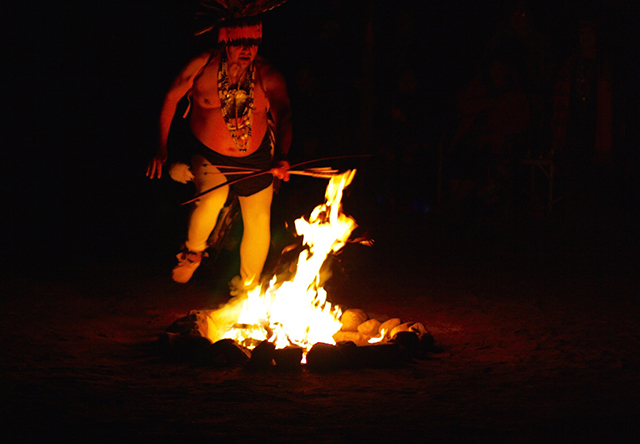 In 2004, the Winnemem held a war dance near Shasta Dam to oppose the Bureau of Reclamation’s proposal to raise the height of the dam. If the dam height is approved, the majority of the remaining sacred and ceremonial sites of the tribe will drown, including Puberty Rock, where the tribe has its right of passage ceremonies for young women. (Photo: Rucha Chitnis)
In 2004, the Winnemem held a war dance near Shasta Dam to oppose the Bureau of Reclamation’s proposal to raise the height of the dam. If the dam height is approved, the majority of the remaining sacred and ceremonial sites of the tribe will drown, including Puberty Rock, where the tribe has its right of passage ceremonies for young women. (Photo: Rucha Chitnis)
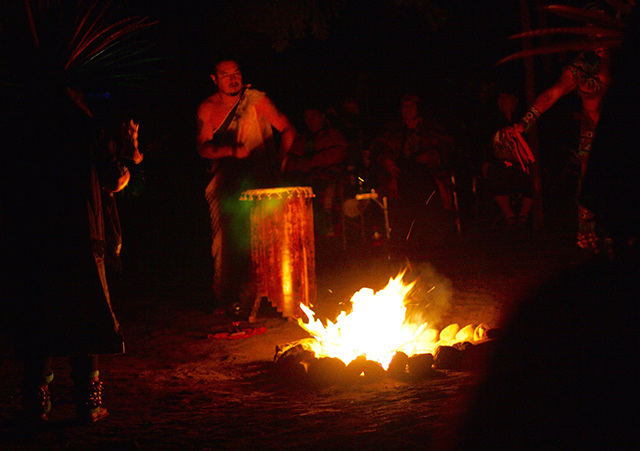 This year’s Fire and Water ceremony of the Winnemem brought together Indigenous peoples and allies from far and wide to honor their cultural diversity and pride through dances, chants and stories and offer a prayer for the sacredness of Mother Earth. Here a group of Aztec (Mexica) dancers from the Bay Area and beyond shared their expression of dance and ceremony. (Photo: Rucha Chitnis)
This year’s Fire and Water ceremony of the Winnemem brought together Indigenous peoples and allies from far and wide to honor their cultural diversity and pride through dances, chants and stories and offer a prayer for the sacredness of Mother Earth. Here a group of Aztec (Mexica) dancers from the Bay Area and beyond shared their expression of dance and ceremony. (Photo: Rucha Chitnis)
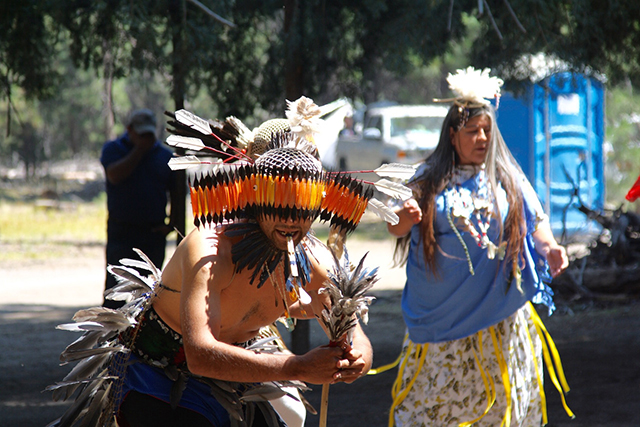 “This gathering is our prayer and vision to heal as we face historic drought and fires in California. We are here to speak for the salmon – our food and spiritual source that are an indicator of healthy ecosystems,” said Michael Preston, Winnemem member and dancer. (Photo: Rucha Chitnis)
“This gathering is our prayer and vision to heal as we face historic drought and fires in California. We are here to speak for the salmon – our food and spiritual source that are an indicator of healthy ecosystems,” said Michael Preston, Winnemem member and dancer. (Photo: Rucha Chitnis)
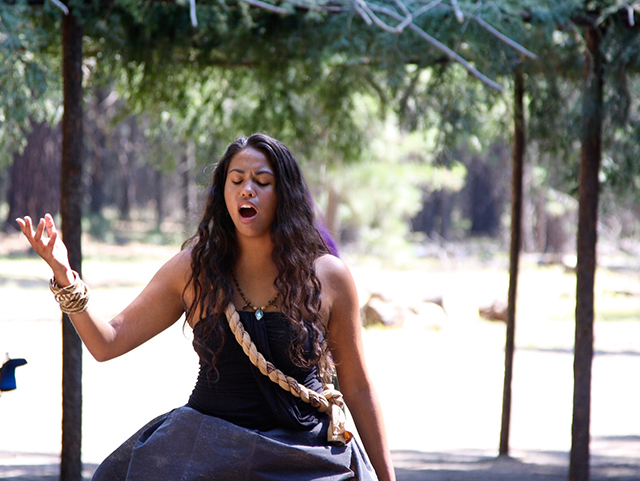 Hāwane Rios, Native Hawaiian, brought to life the spiritual and cultural beliefs of Native Hawaiians, along with her mother Pua Case. They both offered prayers for two sacred mountains – Mauna Kea and Mount Shasta. Hāwane and her family have been on the forefront organizing to stop the construction of the $1.4 billion Thirty Meter Telescope on their sacred mountain Mauna Kea. (Photo: Rucha Chitnis)
Hāwane Rios, Native Hawaiian, brought to life the spiritual and cultural beliefs of Native Hawaiians, along with her mother Pua Case. They both offered prayers for two sacred mountains – Mauna Kea and Mount Shasta. Hāwane and her family have been on the forefront organizing to stop the construction of the $1.4 billion Thirty Meter Telescope on their sacred mountain Mauna Kea. (Photo: Rucha Chitnis)
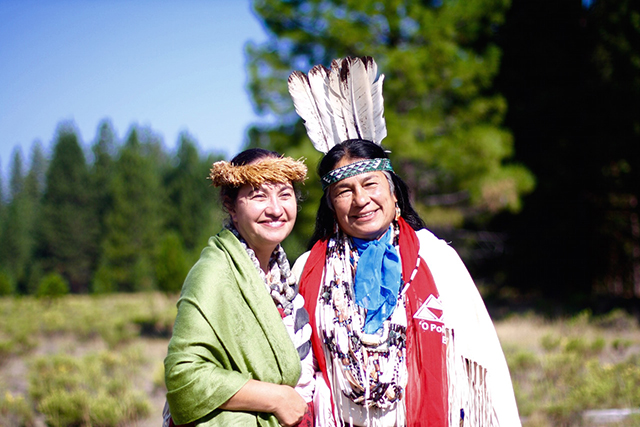 Pua Case and Chief Caleen Sisk offer prayers for their two sacred mountains – Mauna Kea and Mount Shasta – at the sunrise ceremony. “Our mountains are connected. We are here to strengthen the relationship between our mountains and our people. We are all in this together,” said Case. (Photo: Rucha Chitnis)
Pua Case and Chief Caleen Sisk offer prayers for their two sacred mountains – Mauna Kea and Mount Shasta – at the sunrise ceremony. “Our mountains are connected. We are here to strengthen the relationship between our mountains and our people. We are all in this together,” said Case. (Photo: Rucha Chitnis)
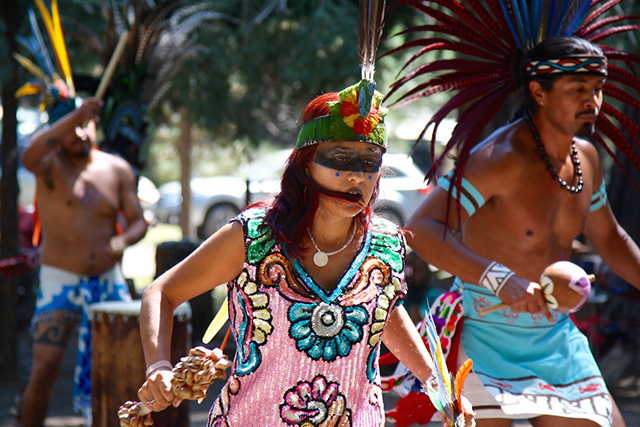 The Aztec (Mexica) dancers offered prayers to elements of Nature and Mother Earth in their dances and expressed gratitude and solidarity with the Winnemem Wintu as they strived for cultural survival against all odds. (Photo: Rucha Chitnis)
The Aztec (Mexica) dancers offered prayers to elements of Nature and Mother Earth in their dances and expressed gratitude and solidarity with the Winnemem Wintu as they strived for cultural survival against all odds. (Photo: Rucha Chitnis)
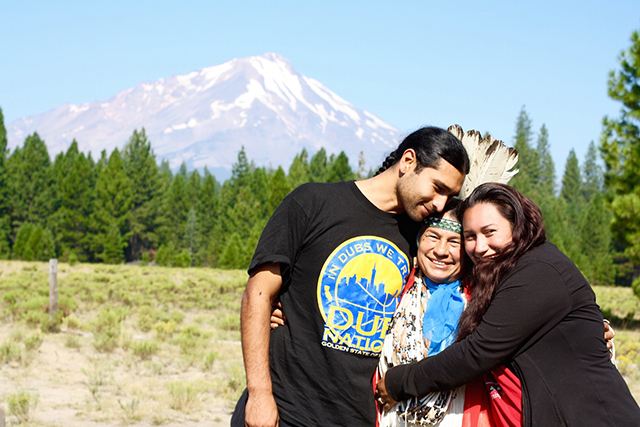 “We are trying to protect thousands of years of our connection to this land. We are trying to stay grounded and maintain a culture that is not valued very much,” said Preston, who is committed to stopping Shasta Dam height increase. “We are trying to show people why it is important to be connected to a place and our water. I hope we go back to restoring our river systems.” Chief Sisk receives a warm embrace from her children, Michael and Marine. (Photo: Rucha Chitnis)
“We are trying to protect thousands of years of our connection to this land. We are trying to stay grounded and maintain a culture that is not valued very much,” said Preston, who is committed to stopping Shasta Dam height increase. “We are trying to show people why it is important to be connected to a place and our water. I hope we go back to restoring our river systems.” Chief Sisk receives a warm embrace from her children, Michael and Marine. (Photo: Rucha Chitnis)
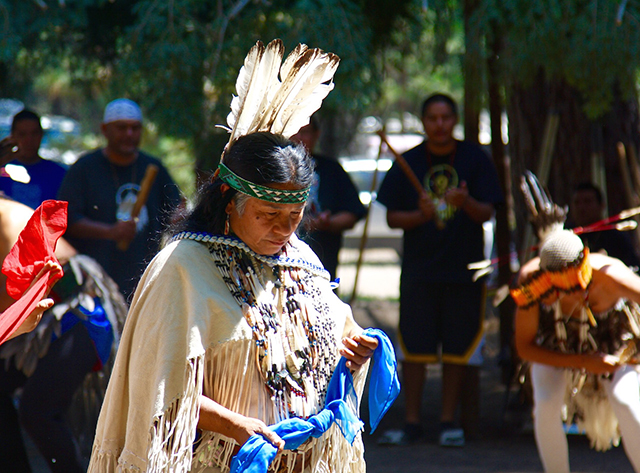 As the Winnemem prepare to fight Shasta Dam proponents, Chief Sisk said she has faith in the people of California and their belief in justice. “The court systems are not set up to bring us justice. But people in California believe in justice. Our land was stolen, and there have been no reparations. We will continue to educate people and tell our story.” (Photo: Rucha Chitnis)
As the Winnemem prepare to fight Shasta Dam proponents, Chief Sisk said she has faith in the people of California and their belief in justice. “The court systems are not set up to bring us justice. But people in California believe in justice. Our land was stolen, and there have been no reparations. We will continue to educate people and tell our story.” (Photo: Rucha Chitnis)
Republished with permission from Indian Country Today Media Network, where it originally appeared on September 24.
Angry, shocked, overwhelmed? Take action: Support independent media.
We’ve borne witness to a chaotic first few months in Trump’s presidency.
Over the last months, each executive order has delivered shock and bewilderment — a core part of a strategy to make the right-wing turn feel inevitable and overwhelming. But, as organizer Sandra Avalos implored us to remember in Truthout last November, “Together, we are more powerful than Trump.”
Indeed, the Trump administration is pushing through executive orders, but — as we’ve reported at Truthout — many are in legal limbo and face court challenges from unions and civil rights groups. Efforts to quash anti-racist teaching and DEI programs are stalled by education faculty, staff, and students refusing to comply. And communities across the country are coming together to raise the alarm on ICE raids, inform neighbors of their civil rights, and protect each other in moving shows of solidarity.
It will be a long fight ahead. And as nonprofit movement media, Truthout plans to be there documenting and uplifting resistance.
As we undertake this life-sustaining work, we appeal for your support. Please, if you find value in what we do, join our community of sustainers by making a monthly or one-time gift.